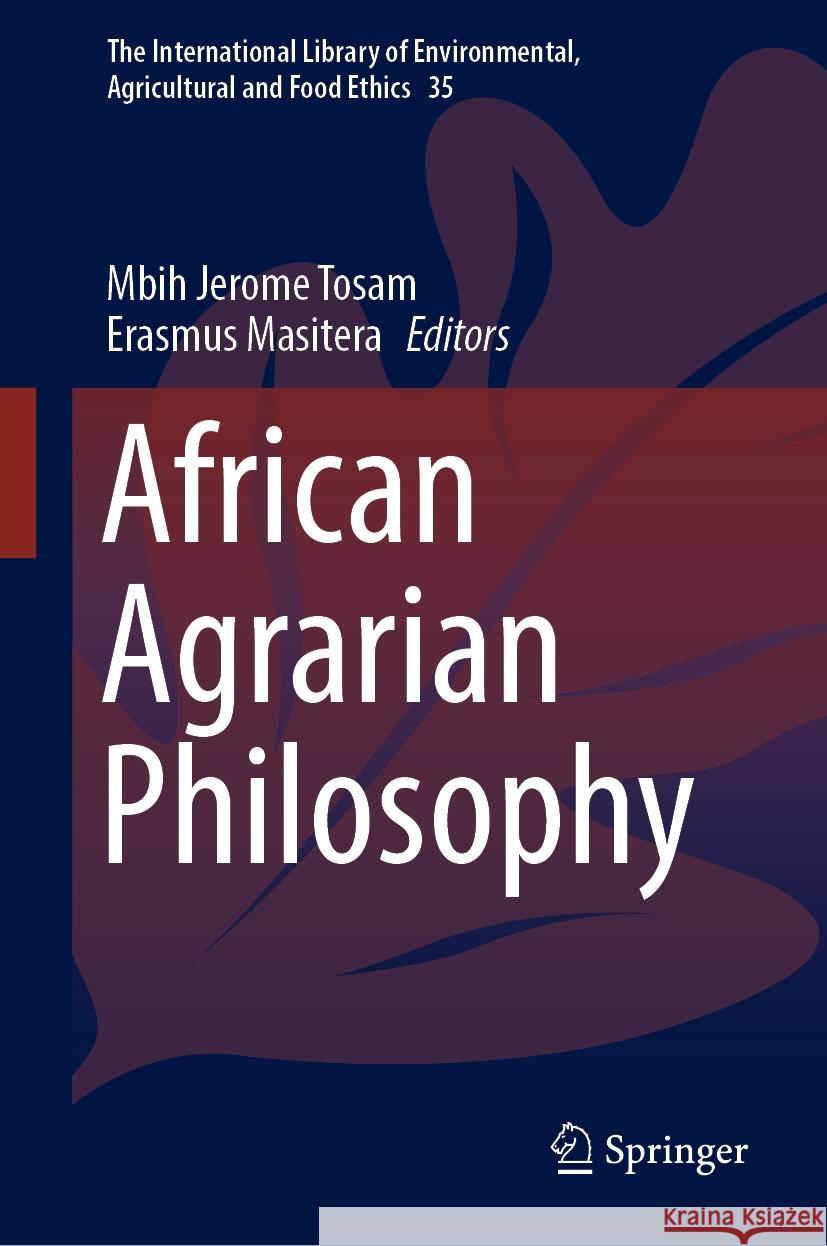African Agrarian Philosophy » książka



(netto: 498,38 VAT: 5%)
Najniższa cena z 30 dni: 462,63
ok. 22 dni roboczych.
Darmowa dostawa!
Introduction: African Agrarian Philosophy? (Mbih Jerome Tosam and Erasmus Masitera)
PART I
African Agrarianism and Human Relation to Nature
1. Murimi munhu: A quest for decoloniality in ‘small scale’ subsistence farming in Zimbabwe (Joseph Pardon Hungwe)
2. The Kom Trilogic Worldview and Agrarian Philosophy (Mbih Jerome Tosam)
3. Human Relation to Nature and African Agrarianism (Nde Paul Ade)
4. Manifestations of Bekwarra Agwunihe Philosophy in Land Ownership and Agricultural Practices (Robert, Odey Simon, Idachu, Paulina Ochuole, and Emuru, Edward Ode)
5. The Confluence of African Agrarianism and Permaculture: Some Observations and Implications (David Anthony Pittaway)
PART II
African Communal Values, Food Ethic, and Development
6. Bekwarra Communal Values, Food Ethics and Folkloric Conception and Interpretations of Animal-Human Relations (Robert, Odey Simon)
7. Agrarian philosophy, community and Adam Smith: African agrarian economics (Mark Rathbone)
8. Unpacking Ndebele agrarian metaphors for the promotion and preservation of communal social development (Faith Sibanda)
9. The religious significance of mushrooms among the Shona people of Zimbabwe: An Ethnomycological approach (Bernard P. Humbe)
PART III
Indigenous Knowledge, Education, and African Agrarianism
10. In search for a pedagogy of African agrarian philosophy (Birgit Boogaard, Bernard Yangmaadome Guri, Daniel Banuoku)
11. The Shona ‘Zunderamambo’ (agricultural welfare system) as a model for social responsibility: A task for higher education systems (Erasmus Masitera)
12. Julius Nyerere’s Ujamaa as an agricentric Philosophy of Education: A Response to the crises of education in Africa (Valentine B. Ngalim)
13. Contemporary challenges in the development and use of agrarian communities’ local indigenous knowledge and practices for sustainable agriculture and climate adaptation: The Case of North West Cameroon (Ngang Eric Ndeh Mboumien)
14. Necessity Is The Mother Of Invention: Famine-induced Adoption Of Conservation Farming “Dhiga-hudye/Dig and eat” In Chivi Communal Lands Of Zimbabwe(James Hlongwana)
15. The practice of African traditional medicine and agrarianism in Zimbabwe: The Quest for this Karanga Agrarian Practice in Madamombe area of Chivi District (Tasara Muguti)
PART IV
African Agrarian Values and Environmental and Sustainability
16. Land Ethics among the Traditional Annangs of Southern Nigeria: Traditional Environmental Ethics, Challenging Contemporary Hostilities towards our Planet (Dominic Umoh)
17. The Farm-Village Practice of Yorubas in West-Central Africa (Babatunde Ogundiwin)
18. An Historical Appraisal of the Fig Tree (Ghim) and Dracaena (Nkeng nkeng) in Traditional Rulership of Bali Chamba Polities(Deyeb Charity Nuvah)
19. Towards Sensitising and Reorienting Contemporary Bekwarra against Deforestation: Prospects and Challenges (Emuru, Edward Odey, Idachu, Maria Ekor, and Idachu, Paulina Ochuole)
20. African Endogenous Knowledge and Sustainable Development: Evolving an African Agrarian Philosophy (Allo y S. Ihuah)
21. Shangwe Environmental Ethics: A Panacea for Agrarian Problems in Gokwe (Dorcas Hwati)
22. Indigenous knowledge and agro-based livelihood dynamics in the Western Highlands of Cameroon (Richard Achia Mbih1and Jude Ndzifon Kimengsi)
23. Agrarian Rituals, Food Security and Environmental Protection in the Bamenda Grassfields of Cameroon (Michael Kpughe Lang)
24. Indigenous African Eco-communitarian, Agrarian Philosophy: Lessons on Environmental Conservation and Sustainability from the Nso culture of North West Cameroon (Peter Takov)
PART V
The Moral Status of Nature and African Agrarian Culture
25. ‘Defending a Relational Account of Animal Moral Status’ (Thaddeus Metz)
26. Farming and Animals Welfare in the African Context (Nde Paul Ade)
27. The Inseparable Connection between African Metaphysics and African Agrarian Philosophy (Nelson Shang)
28. The Phenomenon of Male and Female Crops and Gender Equality in Igbo-African Agrarian Culture (Anthony Uzochukwu Ufearoh)
PART VI
Ethical, Political, and Economic Issues in Agriculture in Contemporary Africa
29. The Farm in Colonial and Postindependence Imagination: A Crisis of Continuity (Mbuh Tennu Mbuh)
30. Conceptual frameworks for an African Sustainable Agriculture: Beyond John Locke, the Cold War and the Scramble of World Religions (Angela Roothaan)
31. Henry OderaOruka’sParental Earth Ethics as ethics of duty towards ecological fairness and global justice (Pius Mosima)
32. Socio-economic practices and pseudo-prosperity in the cocoa producing village of Bombe Bakundu (Cameroon), 1945-2000 (Nixon Kahjum Takor)
33. Food Security as a Fundamental Human Right: A Philosophical Consideration from Africa (Maduka Enyimba and Victor C. A. Nweke)
34. Consumer Activism: Towards Redirecting the Moral economy of Food (Abiodun Paul AFOLABI)
35. Rethinking Shangwe Traditional Philosophy in Resolving Agrarian Wrangles in Contemporary Gokwe Communities (Elvis Tsvangirayi Siziva)
Mbih Jerome Tosam is senior lecturer and chair of philosophy at the University of Bamenda, Cameroon. He obtained his PhD in philosophy from the University of Yaoundé I, Cameroon, in 2011. His research interests are in the areas of bioethics, environmental ethics, philosophy of medicine, and African philosophy. Some of his recent publications include: “The Moral Status of the Human Embryo: a Critique of Peter Singer’s Conception of the Potentiality of the Embryo,” International Journal of Philosophy and Theology 3, no. 2, (2015): 39-47; Philosophy in Culture: Perspectives from Western and African Culture, co-edited with Peter Takov (Mankon, Bamenda: Langaa 2016); and “Global Emerging Pathogens, Poverty, and Vulnerability: An Ethical Analysis” in ed. Godfrey B. Tangwa et al., Socio-cultural Dimensions of Emerging Infectious Diseases in Africa: An Indigenous Response to Deadly Epidemics (Springer, 2019).
1997-2026 DolnySlask.com Agencja Internetowa
KrainaKsiazek.PL - Księgarnia Internetowa









